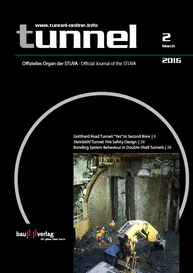Gotthard Road Tunnel:„Yes“ to Second Bore
On February 28, 2016, a referendum held in Switzerland narrowly decided in favour of building a second bore for the Gotthard Road Tunnel, which links Göschenen in Canton Uri with Ariolo in Ticino. The controversial new bore will be provided with two lanes to cope with traffic from the existing 17 km long tunnel opened in 1980, which urgently needs to be repaired and upgraded. Afterwards, both will function as single-lane directional tunnels as established by law. This approach will provide the Gotthard Road Tunnel with enhanced operational safety without increasing its capacity – while at the same time it is hoped to prevent traffic actually growing.
Safer directional Traffic in two Tubes
Thanks to single-lane, directional traffic per tunnel tube, it will be possible to substantially improve safety in the Gotthard Road Tunnel, for a lack of two-way traffic signifies a considerably reduced accident risk. Accidents such as the one in 2001, for instance which saw eleven people die in an inferno caused after two lorries sustained a head-on collision, will no longer occur.
However, a section of the Swiss population fears that after the second tunnel bore is built, sooner or later all available lanes will be used at the same time leading to a considerable hike in traffic with an ever growing number of lorries using the tunnel between Ariolo and Göschenen.
Against this background, the referendum took place on February 28, 2016. As a result, 57 % of those who voted approved the motion to build a second tunnel tube for the Gotthard cushioning the redevelopment of the existing tunnel. The biggest majority vote was registered in the Canton of Schwyz with 68.2 %, whereas in the two affected cantons – Uri and Ticino, the approval figure was 53 % and 57.8 % respectively.
Redevelopment and Optimization of the existing Tunnel
With two-way traffic in operation, the tunnel has had to cope with on average of 6 million vehicles (5 million cars and 1 million lorries) per annum. The intermediate ceiling in the existing tube (possibly using textile concrete) and the roadway surface are to be renewed to maintain the structural substance and functionality as well as to enhance safety. In this connection, the useful traffic area is to be provided with a clearance profile increased from 4.50 to 5.20 m, the ventilation system fitted among other things with new jet fans and the safety tunnel enlarged to cope with further cables. Extensive surveys had shown that the scheme could only be executed if the Gotthard Road Tunnel were to be permanently closed for a fair length of time with corresponding effects on road traffic such as detours and resorting to rail making use of loading terminals.
New, second Tunnel Bore
As a consequence, the Federal Council and parliament advocate the construction of a second tunnel tube on the other side of the existing tube’s safety tunnel – prior to redeveloping and improving the existing tunnel tube. It is to be produced by tunnel boring machines starting from Ariolo and Göschenen with corresponding exploratory tunnels.
Timetable and Costs
It will take roughly seven years to build the second tunnel bore. Thereafter, the new tube is due to take over traffic so that the existing tunnel can be upgraded and optimized within some three years.
The time required for designing and planning a second tunnel tube is difficult to assess given the opportunities to lodge objections and appeals. It is intended to construct the new bore as from about 2020. By 2030 the redevelopment of the existing tube is expected to be finished, then both bores will function with single lanes with the second lanes available as emergency lanes.
The project as put forward by the Federal Council and the majority in parliament will probably cost around 2.8 billion Swiss francs: 2 billion for the second bore and 800 million for redeveloping and improving the existing tube. The operating and maintenance costs will initially amount to some 10 million francs per annum when the project is completed. Building the second tube of the Gotthard is seen as developing the national highway network and will be financed from the special fund for road traffic (SFSV).
If the second bore were not to be constructed, the Gotthard Road Tunnel would have to be completely closed repeatedly to be upgraded. This in turn, would make it necessary for cars and lorries to be carried by rail – a costly business. According to the Swiss Department for the Environment, Transport, Energy and Communications (DETEC), the redevelopment work and traffic management would cost a total of 1.2 to 2 billion francs.
G. B.

